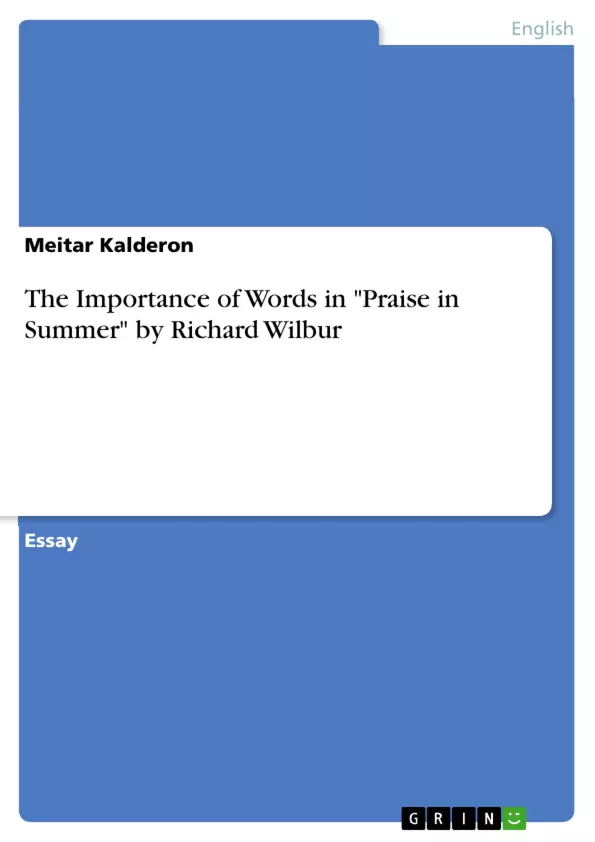Published in 1947, "Praise in Summer" by Richard Wilbur is a sonnet that conveys a bizarre world by weaving an immersive conceit: "The hills are heavens full of branching ways / Where star-nosed moles fly overhead the dead" (3–4). The poet imagines a magnificent space flipped upside down. Exploring nature's wonders, he describes gliding moles and digging sparrows. The idea of inverted earth raises questions about the legitimacy of chaos in our lives. Should we allow confusion and disorder to dictate the way we think? Wilbur employs several literary devices – complex conceit, inversive and absurd figurative language, reconstruction of the sonnet's form, colorful devotional language, and musical dissonance – to expose the significance of metaphors in our lives.
Inhaltsverzeichnis (Table of Contents)
- The Importance of Words in “Praise in Summer” by Richard Wilbur
- Introduction
- Inversion of the Natural Order
- The Absurdity of Metaphors
- The Sonnet’s Distinctive Form
- The Sonnet’s Volta
- The Sonnet’s Prosody
- The Sonnet’s Octave
- Wilbur’s Conclusion
- Shakespeare’s Approach
- Conclusion
Zielsetzung und Themenschwerpunkte (Objectives and Key Themes)
This essay examines Richard Wilbur's sonnet "Praise in Summer" and explores the importance of metaphors in poetry. It analyzes Wilbur's use of figurative language, his unconventional form, and his engagement with the concept of the absurd to show how metaphor contributes to the meaning and impact of his work.
- The role of figurative language in poetry
- The relationship between metaphor and meaning
- The influence of philosophical ideas on poetic form and content
- The significance of poetic structure and its relation to meaning
- The impact of poetic devices on the reader’s experience
Zusammenfassung der Kapitel (Chapter Summaries)
- Introduction: The essay introduces the sonnet “Praise in Summer” and its unique conceit, setting the stage for an exploration of the importance of words in the poem.
- Inversion of the Natural Order: This section analyzes how Wilbur's use of inverted figurative language, such as "flying moles" and "burrowing sparrows," creates a strange and unsettling world that ultimately reveals the power of metaphor to shape meaning.
- The Absurdity of Metaphors: The essay explores Wilbur's use of absurdity and how it relates to the philosophical ideas of Albert Camus. This section suggests that the poem embraces the tension between our desire for meaning and the inherent absurdity of existence.
- The Sonnet’s Distinctive Form: The essay examines the unconventional structure of Wilbur's sonnet, highlighting how the poem's form reflects and reinforces the themes of inversion and the importance of poetic wit.
- The Sonnet’s Volta: This section focuses on the turning point in the poem, analyzing how the speaker shifts from praising his imagined world to questioning the validity of his metaphors.
- The Sonnet’s Prosody: This section delves into Wilbur's use of iambic pentameter and how the sonnet's prosody creates a contrast between the mundane and the meaningful, mirroring the speaker's inner conflict.
- The Sonnet’s Octave: This section analyzes the second part of the sonnet, where the speaker grapples with the potential destructive nature of metaphors and explores their relationship to our perception of the natural world.
- Wilbur’s Conclusion: The essay examines how Wilbur's final question in the sonnet, “Should it not be enough of fresh and strange / That trees grow green, and moles can course in clay, / And sparrows sweep the ceiling of our day?” (12–14), provides a nuanced perspective on the role of metaphors in poetry and the importance of appreciating the everyday world.
- Shakespeare’s Approach: The essay draws a comparison between Wilbur's approach to metaphors and Shakespeare's treatment of the same theme in Sonnet 18. It highlights the different conclusions reached by the two poets regarding the power and limitations of language.
Schlüsselwörter (Keywords)
The primary keywords in this analysis include metaphors, poetry, Richard Wilbur, Albert Camus, absurdity, sonnet, figurative language, poetic structure, meaning, and perception.
- Quote paper
- Meitar Kalderon (Author), 2022, The Importance of Words in "Praise in Summer" by Richard Wilbur, Munich, GRIN Verlag, https://www.hausarbeiten.de/document/1322104


